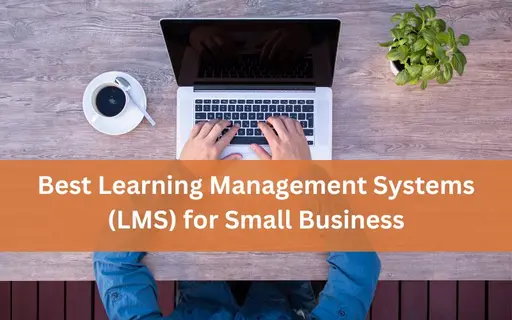In today's dynamic workplace environment, businesses acknowledge the critical importance of fostering and enhancing the skills and knowledge of their workforce. Timely training is essential to upgrade employees' capabilities to effectively perform their roles. Previously, this process was cumbersome and resource-intensive, requiring companies to rent venues for classes, print extensive materials, and consume significant time. Moreover, traditional training methods meant reduced productivity as employees were occupied with learning sessions. However, technological advancements have revolutionized learning methodologies, making them more cost-effective and efficient. One notable innovation is the Learning Management System (LMS).
What is a Learning Management System (LMS)?
A learning management system is software that helps to create, manage, organize and deliver online educational or training materials. It is a central hub for all the corporate training needs. It streamlines the entire learning process by providing a user-friendly platform and help to manage the entire program for instructors to upload course materials, learners to access and complete training modules. For instance, earlier when an employee was looking for training materials in a maze of emails and file-sharing sites, outdated versions and missed updates used to be constant headaches. An LMS eliminates this chaos. It provides unified training content, ensuring everyone has access to the most up-to-date knowledge. Additionally, LMS automates tasks such as enrollment and notifications, which helps the instructors to allocate their time more effectively.
Importance of LMS for Small Business
Think of an LMS system for small business as a scoreboard. It tracks everyone's progress using quizzes, tests, and surveys and helps the owner to see how well employees are learning. This will lead to figuring out if employees can retain knowledge or be able to pick up the skills they need to perform at their jobs. A Learning Management System (LMS) can be a game-changer for keeping the business grow efficiently.
Here's why an LMS is a smart investment for the small businesses:
Streamlined Training: It helps employees to do the training in a sequential way, so they don't get overburdened with the bundles of paper and scattered training emails. LMS streamlines all the training materials in a user-friendly platform.
Cost-Effective Training: Training new employees or upskilling the existing team can be expensive. An LMS helps small businesses to cut costs by eliminating the need for printed materials and external training providers for basic courses. It creates and delivers the training content and saves money for future growth.
Boosts Employee Efficiency: The faster a team learns new skills, the sooner they can become productive contributors in the business. An LMS allows employees to learn at their own pace, through interactive modules and engaging formats. This leads the small businesses to expand and grow faster in the long run.
Improved Consistency: Traditional training methods can vary depending on the trainer. An LMS ensures everyone receives the same core information, delivered consistently. This creates a standardized knowledge base for the team, leading to smoother communication and collaboration in the business.
Tracks Progress and Identifies Needs: An LMS tracks employee progress through training modules and assessments. This allows you to identify areas where employees might need additional support. This data is valuable for tailoring future training programs and ensuring that the employees have the skills they need to succeed.
How to select a Learning Management System
Learning Management System (LMS) for small business involves considering several key factors to ensure it meets your specific needs and budget.
Below is the step-by-step guide to help you through the best LMS for small business:
Requirements
- Training Needs: Identify the specific learning goals and types of training to deliver (e.g. onboarding, compliance training, skill development).
- User Base: Determine the number of users (employees, contractors, etc.) who will access the system.
- Features: List essential features such as content creation tools, assessments, analytics, mobile compatibility, and integration capabilities with existing software.
Set a Budget
- Consider the total cost of ownership, including initial setup fees, licensing costs, ongoing maintenance, and support fees.
- Compare pricing models (per user, subscription-based, one-time purchase) to find what fits your budget.
- Online Reviews: Look for reviews and testimonials from other small businesses and compare them with each other for better user satisfaction.
- Vendor Reputation: Choose a reputable vendor with experience serving small businesses and a track record of reliable support.
- Demo and Trial: Request demos or trial versions of potential LMS platforms to evaluate usability and feature suitability.
- Usability: Ensure the platform is user-friendly for both Instructor and Employees.
- Customization: Check if the LMS allows customization of the interface, branding, and course content to align with your business identity. Scalability: Consider whether the LMS can grow with your business as your training needs expand.
Check Integration and Compatibility
- Verify if the LMS integrates smoothly with your existing software ecosystem (e.g., HR systems, CRM, content management tools).
- Ensure compatibility with different devices and operating systems to accommodate remote and mobile learners.
Support and Maintenance
- Review the vendor's support options (e.g., customer service availability, online resources and user forums).
- Clarify the terms of maintenance and updates to ensure ongoing functionality and security.
Security and Compliance
- Prioritize LMS platforms that adhere to industry standards for data security and compliance, if applicable to your business.
- Stakeholder Input: Involve key stakeholders (such as HR managers, IT staff and trainers) in the decision-making process to gather diverse perspectives.
- Contract Review: Carefully review the contract terms, including cancellation policies and data ownership rights, before making a final commitment.
Implementation and Training
- Plan for a smooth implementation process, including data migration (if applicable) and user training sessions to ensure adoption and usability.
- Allocate resources for ongoing training and support to maximize the LMS's effectiveness.
Monitor and Evaluate
- Continuously monitor the LMS's performance and user feedback to identify areas for improvement and ensure it continues to meet your business needs.
By following these steps, you can effectively select a small business LMS that aligns with the business goals, enhances employee learning and development. An LMS might seem like a complex tool for a small business, but many user-friendly and affordable options are available. Investing in an LMS can give your small business a competitive edge by fostering a culture of continuous learning and keeping your team at the top of their game.
FAQs
How do I choose an LMS for a Small Business?
There are many factors that affect while choosing LMS for small businesses are cost, ease of use, scalability, customization options, integration with existing tools and the specific training needs of their employees. Which leads to upgradation of employees' skills and development with better productivity.
Why is LMS required?
A Learning Management System (LMS) is a necessity for organizations seeking to streamline training delivery, improve knowledge retention and effectively measure employee development. By centralizing training materials and offering features for assessments and progress tracking, an LMS empowers businesses to ensure consistent knowledge acquisition and efficient skill development across their workforce.
Related Posts

24 October, 2025

29 September, 2025


